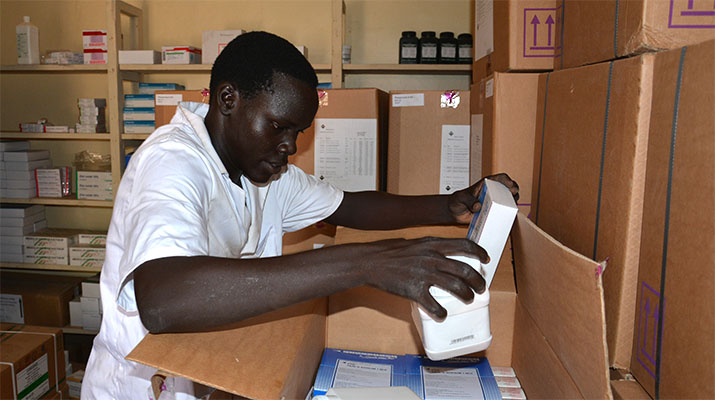Dr. Bruno Jeremiah, a pharmacist at Al Sabbah Children’s Hospital in Juba, South Sudan, squats on the floor in his white coat. He selects small cartons of medicine to hand to his colleague, storekeeper Julius Leonardo.
The South Sudan Ministry of Health’s medicine supply system is kit-based, meaning that medicines are packed into kits for quarterly distribution to health facilities. Kits must be opened, sorted, and inventoried by a pharmacist or a trained health professional to ensure easy access, accurate documentation, and effective management.

Jeremiah is responsible for managing the medicine supply system, including monitoring medicine consumption and reporting. However, poor storage conditions and recordkeeping frequently leave him struggling to locate medicines and produce the monthly stock consumption reports required by the Ministry of Health. Without accurate consumption data, Jeremiah has to base his request for medicines on estimates. Inaccurate quantities can lead to overstocking or stock-outs of medicines. Overstocking in health facilities can result in unnecessary congestion in stores and wasted resources if drugs expire and must be destroyed.
“It was difficult to monitor consumption of most medicines, except adrenaline, antimalarial, diazepam, benzylpenicillin, and syringes. Sometimes medicines would expire while in storage because nobody knew where they were,” says Jeremiah.
In May 2016, as part of an effort to improve medicine management at health facilities, the US Agency for International Development-funded Systems for Improved Access to Pharmaceuticals and Services (SIAPS) provided 10 shelves to Al Sabbah Children’s Hospital.
In addition, SIAPS provided technical support for the removal of expired and unusable stock and on-the-job training on store and inventory management. In total, 250 shelves have been distributed to health facilities in the former Western and Central Equatoria.
“The store is now clear and clean. It is very easy to understand and manage what medicines are going out and coming in,” says Leonardo.
See the full story here.

